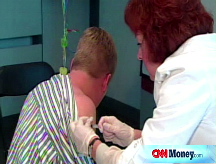Why health care pools haven't worked
Pooling together small businesses to negotiate as a group for health-care coverage is a popular idea, but most attempts have fizzled.

(CNNMoney.com) -- One of the keys to the various health reform plans kicking around Washington is "pooling." The proposal floated by President Obama during the campaign, for instance, would establish a National Health Insurance Exchange designed to help small businesses and individuals reduce their premiums.
Pooling is a great idea in theory. But historically, it hasn't succeeded at significantly expanding affordable coverage.
The premise is simple: Set up a system to allow individuals and small employers to band together to join group plans that they would otherwise not have access to. These "pooled" plans can then negotiate with insurers and cut the same preferential deals that major corporations are able to. By pulling thousands of people together, the pools mimic the economics of scale that let large companies negotiate lower costs from insurers for their employees' coverage.
"The basic idea goes way, way back," explains Elliot Wicks, a senior economist with the hospital network Health Management Associates who has studied pooling proposals for more than a decade.
In 1989, economists Alain Enthoven and Richard Kronick proposed a network of "public sponsors" that would help manage and regulate the private purchasing of health insurance. This embryonic attempt at providing cheaper insurance through expanded pools ended up as the core of Hillary Clinton's ill-fated 1993 "managed competition" plan.
Even as it was failing on the federal level, though, the notion of government-established insurance pools was being experimented with at the state level. Following a popular pooling plan created by Cleveland's Council of Small Employers in the 1970s, about a dozen states created state-organized plans to gather small employers together into purchasing pools. The most successful of these was the Health Insurance Plan of California, created in 1993, which at its peak four years later covered about 7,000 participating employers representing 134,000 enrollees.
California's HIPC ultimately fizzled, though, for a couple of reasons. First off, one of the main attractions of the plan to small employers - that each of their employees could choose from any insurance package, rather than an entire business having to pick a one-size-fits-all plan - was a turn-off for insurers. As Wicks puts it, "They were all worried that they were going to get all the sick employees."
More problematic was that HIPC didn't, in the end, cut costs. A 1999 study by the California HealthCare Foundation, in fact, found that it would cost small businesses about 6% less to buy coverage outside HIPC than via the state-sponsored plan.
The problem was that even as the largest state health insurance pool, HIPC still only commanded a tiny share of the state's small businesses and individuals.
"You have a dilemma here: you can only be effective as a bargainer, the way large businesses do, if you have enough business to make the insurers give you a favorable price," Wicks says. "But unless you have a better price, it's very hard to attract the number of enrollees to get that mass. So without something that puts a lot of people into these, it's hard to have much bargaining power."
The solution, say pooling advocates, is to find some way to either force or strongly encourage people to join pools, in order to create a force that insurance companies can't ignore. It's what Massachusetts did in creating its Commonwealth Connector in 2006, for example, by requiring that everyone in the state either procure health insurance or pay fines.
It's one reason many observers believe we're likely to see mandatory health coverage become national law. Though Obama opposed mandates during the campaign, Sen. Max Baucus and others have more recently incorporated required health coverage into their Congressional health reform plans.
Mandatory coverage is also something the insurance industry is insisting on in exchange for allowing individuals to get insurance without regard for prior medical history. Their concern isn't solely getting a guaranteed market for their products, say health care experts. There's also the legitimate worry that if pre-existing conditions are no longer a bar for coverage, young, low-risk individuals will forgo getting insurance until they become sick - draining the system of the healthy payers who help to keep premiums low for everyone else.
Even then, though, most observers agree that pools by themselves won't do the trick without substantial government subsidies to go along with them. It's a lesson that Massachusetts, for one, has learned the hard way. It severely underestimated the numbers of individuals who would qualify for subsidies - any state residents earning less than triple the federal poverty line, or about $63,000 for a family of four, are eligible - and had to both allocate hundreds of millions of dollars in additional funds and allow waivers for many of those who remained uninsured.
"Any of these national proposals are going to have to offer substantial subsidies, because the cost of health insurance is so high that minor subsidies are just not going to draw in many people," concludes Wicks. "And if you make it mandatory that you provide coverage, you've got to provide subsidies sizable enough to make it affordable." ![]()
The Health Care Crisis
The hidden business killer
Blueprints for a fix
5 ways to tame costs
Health care help: What's new for 2009
Massachusetts' mandate
New visions: 6 entrepreneurial ideas
iReport: Share your health care stories
-
The Cheesecake Factory created smaller portions to survive the downturn. Play
-
A breeder of award-winning marijuana seeds is following the money and heading to the U.S. More
-
Most small businesses die within five years, but Amish businesses have a survival rate north of 90%. More
-
The 10 most popular franchise brands over the past decade -- and their failure rates. More
-
These firms are the last left in America making iconic products now in their twilight. More













